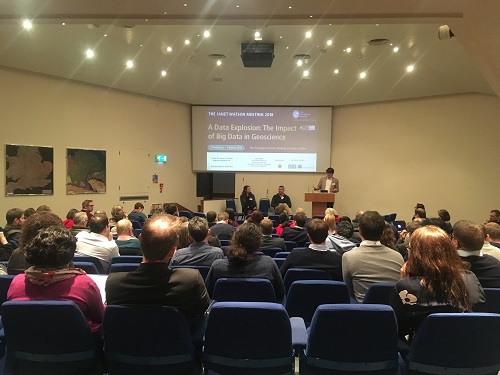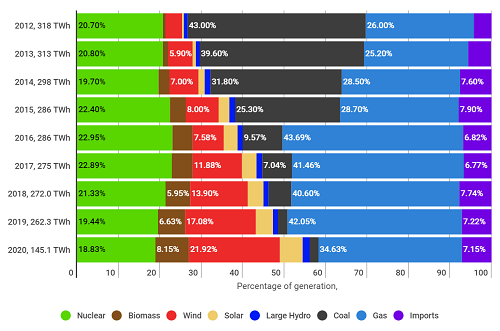Kirstie Wright and Caroline Gill on the newly repositioned Energy Group and how supporting the energy transition is crucial to the future of geoscience
Wright, K and Gill, C., The Energy Group and its transition. Geoscientist 30 (8), 16-19, 2020
https://doi.org/doi: 10.1144/geosci2020-105, Download the pdf here
 Geological evidence shows that CO2 has a major effect on the climate system, with human activities responsible for recent warming. No other issue is so pressing for the human race, with the potential to disrupt our society on such a fundamental level.
Geological evidence shows that CO2 has a major effect on the climate system, with human activities responsible for recent warming. No other issue is so pressing for the human race, with the potential to disrupt our society on such a fundamental level.
The 2015 Paris Agreement sought to limit net anthropogenic greenhouse gas emissions in order to keep global average temperature below 2 °C of pre-industrial levels, and pursue efforts to limit the increase to 1.5 °C, to substantially reduce the risks and effects of climate change. In 2019, the UK government committed to the UK becoming net zero by 2050, by increasing the contribution of renewables to our energy supply and decreasing carbon emissions from the fossil fuel industry.
The Petroleum Group of the Geological Society of London has always endeavoured to remain relevant to an ever-evolving industry and constantly changing geopolitical environment. We recognise it is time for our Group to take a proactive role in the wider energy transition and we have therefore taken the decision to broaden our scientific remit and become the Energy Group of the Geological Society.
“One of the great challenges of our time is to move our mindset from exploring and exploiting our planet, to its stewardship and sustainability. To this end, The Geological Society’s move to develop an “Energy Group” to represent the broad spectrum of Earth sciences in energy generation, transmission and storage and the management of its waste products such as carbon and radioactive waste, is a major and adventurous step into the future.”
Michael Daly, President of the Geological Society of London
The origins of the Energy Group
 Right: The 30th Anniversary Annual Dinner and Awards, held in 2019 in the Jerwood Gallery at the Natural History Museum, during the installation of Luke Jerram's Museum of the Moon. Our annual event will transition with us into the Energy Group Dinner and Awards to celebrate our industry and those who are contributing to it
Right: The 30th Anniversary Annual Dinner and Awards, held in 2019 in the Jerwood Gallery at the Natural History Museum, during the installation of Luke Jerram's Museum of the Moon. Our annual event will transition with us into the Energy Group Dinner and Awards to celebrate our industry and those who are contributing to it
The Petroleum Group has been the Geological Society of London’s special interest group in Petroleum Geoscience for the last 40 years. In that time, the group has held over 285 scientific meetings, produced 60 Special Publications and complied 25 Petroleum Geoscience thematic sets. Subjects covered have ranged from advances in subsurface technology, evaluation of new and existing regional exploration to developments in geological and geophysical science. We continually strive to deliver high quality, leading edge petroleum geoscience, striking a balance between academic research and applied industrial studies.
For the past 30 years we have also held an Annual Dinner and Awards to celebrate advancements in petroleum geoscience, awarding a total of 48 medals to recognise excellence at various career stages. Our medals will transition with us into the Energy Group Awards and will celebrate those individuals who are excelling across the energy sector in both academia and industry. As we evolve, our dinner will change, but will still provide the opportunity to celebrate our industry and those who are contributing to it.
The need to evolve
As the Energy Group, we will encompass all geoscience aspects of the full cycle delivery of energy to society. This includes, but is not limited to, carbon capture, utilisation and storage, radioactive waste disposal, geothermal energy and the role of geoscience in renewable energy sources.
Meanwhile, petroleum geoscience will remain an integral component of our scientific programme. With fossil fuels currently contributing approximately 43.8 % to the energy consumed in the UK and petrochemicals fundamental in producing the raw materials used in renewable technology and society, they will play a significant part in the energy mix over the coming decades.
 Left: We endeavour to remain relevant to an ever-evolving industry, with our technical meetings exploring the latest in geoscience, such as the 2018 Janet Watson Meeting on The Impact of Big Data in Geoscience, held at the Geological Society of London, Burlington House
Left: We endeavour to remain relevant to an ever-evolving industry, with our technical meetings exploring the latest in geoscience, such as the 2018 Janet Watson Meeting on The Impact of Big Data in Geoscience, held at the Geological Society of London, Burlington House
We also want to support current and future geoscientists by being a forum for subsurface-based, energy-related skills and demonstrate how geological science can meet the challenges of the future. Early career geoscientists entering the petroleum industry today will be essential in both optimising existing hydrocarbon resources and facilitating the energy transition. As the Energy Group, we will maximise opportunities where there is significant overlap between the specific skills developed in the petroleum industry and key components of the energy transition, promoting events where we can learn and move forward together. Geoscience professionals working in oil and gas have a key role to play in the future energy mix, by offering some of the UK’s most innovative, risk-aware, problem solvers to the technologies of the future.
"It’s important as we face the energy transition to consider the whole energy system as one rather than its components. We need to see the bigger picture but with petroleum part of the integral conversation especially as we welcome a new generation into our world."
Ingrid Demaerschalk, Committee Member
To be able to support our transition to the Energy Group, we will also be soliciting nominations for committee members with knowledge and experience of non-hydrocarbon related energy geoscience. The committee consists of up to 20 members, elected each year from both industry and academia, with nominations closing on the 25th September 2020. This will ensure that the group offers relevant lectures, workshops, and conferences as part of our annual events programme. To develop a scientific programme that represents the expanded scope of the Energy Group, we encourage the submission of technical conference proposals that showcase the role of geoscience in the energy transition, together with those that continue to lead the way in cutting edge petroleum geoscience.
“As the energy sector continues to evolve and change as part of an energy transition, its need for geoscience increases and changes too. Becoming the Energy Group allows us to be more inclusive and representative of the wider geological community working in the energy sector”
David McNamara, Committee Member
Securing the future
Much of the world’s future energy supplies will be dependent on the unique skills we possess as geoscientists. We are positioning the Energy Group of the Geological Society to lead the way by adapting to these challenges, actively engaging in the transition towards a carbon neutral environment and assisting in combating climate change.
“Whilst recognising the differing views of our membership, there was overwhelming support for the proposed broadening of our remit, demonstrating the willingness and commitment within our industry to support the energy transition. I look forward to supporting the Energy Group long into the future”
Lucy Williams, Chair of the Petroleum Group 2018-2019
We invite the geoscience community to support our efforts as the Energy Group by joining the group, nominating committee members and suggesting technical meeting proposals. Preparations are already underway to develop a conference exploring the role of geoscience in Carbon Capture, Storage and Utilisation, which will form the cornerstone of the late 2021/2022 programme.
We hope you will join us on this exciting new journey, as together we continue to explore and innovate in the constantly evolving energy sector!
Below: The breakdown of the UK energy mix between 2012-2020, clearly indicating a growing increase in renewables, such as wind, solar and hydro, and the changing contribution of fossil fuels from coal to gas. In 2020 the contribution of fossil fuels (gas, coal and fuel imports) amounting to approximately 43.8%. Image used with permission of Dr Andrew Crossland, My Grid GB.
 Authors
Authors
Dr Kirstie Wright, Communications Officer of the Energy Group
Dr Caroline Gill, Chair of the Energy Group
Further Reading